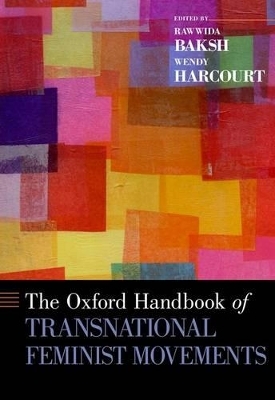
The Oxford Handbook of Transnational Feminist Movements
Oxford University Press Inc (Verlag)
978-0-19-994349-4 (ISBN)
The OXFORD HANDBOOK OF TRANSNATIONAL FEMINIST MOVEMENTS explores the historical, political, economic and social contexts in which transnational feminist movements have emerged and spread, and the contributions they have made to global knowledge, power and social change over the past half century. The publication of the handbook in 2015 marks the fortieth anniversary of the United Nations International Women's Year, the thirtieth anniversary of the Third World Conference on Women held in Nairobi, the twentieth anniversary of the Beijing Declaration and Platform for Action, and the fifteenth anniversaries of the Millennium Development Goals and of UN Security Council Resolution 1325 on 'women, peace and security'.
The editors and contributors critically interrogate transnational feminist movements from a broad spectrum of locations in the global South and North: feminist organizations and networks at all levels (local, national, regional, global and 'glocal'); wider civil society organizations and networks; governmental and multilateral agencies; and academic and research institutions, among others.
The handbook reflects candidly on what we have learned about transnational feminist movements. What are the different spaces from which transnational feminisms have operated and in what ways? How have they contributed to our understanding of the myriad formal and informal ways in which gendered power relations define and inform everyday life? To what extent have they destabilized or transformed the global hegemonic systems that constitute patriarchy? From a position of fifty years of knowledge production, activism, working with institutions, and critical reflection, the handbook recognizes that transnational feminist movements form a key epistemic community that can inspire and provide leadership in shaping political spaces and institutions at all levels, and transforming international political economy, development and peace processes.
The handbook is organized into ten sections, each beginning with an introduction by the editors. The sections explore the main themes that have emerged from transnational feminist movements: knowledge, theory and praxis; organizing for change; body politics, health and well-being; human rights and human security; economic and social justice; citizenship and statebuilding; militarism and religious fundamentalisms; peace movements, UNSCR 1325 and postconflict rebuilding; feminist political ecology; and digital-age transformations and future trajectories.
Dr. Rawwida Baksh is an independent researcher, writer and policy adviser on women's rights and gender equality. She is affiliated with the Institute of Gender and Development Studies at the University of the West Indies, St. Augustine, Trinidad and Tobago. Dr. Wendy Harcourt is Associate Professor of Critical Development and Feminist Studies at the International Institute of Social Studies, Erasmus University, The Hague, The Netherlands.
List of Contributors ; Chapter 1: Introduction ; Rawwida Baksh and Wendy Harcourt ; SECTION ONE: KNOWLEDGE, THEORY AND PRAXIS ; Introduction ; Wendy Harcourt ; Chapter 2: Transnational Feminist Activism and Movement-building ; Valentine M. Moghadam ; Chapter 3: Mapping Transnational Feminist Engagements: Neoliberalism and the Politics of Solidarity ; Linda E. Carty and Chandra T. Mohanty ; Chapter 4: Critical Cartography, Theories, and Praxis of Transnational Feminisms ; Manisha Desai ; SECTION TWO: ORGANIZING FOR CHANGE ; Introduction ; Rawwida Baksh ; Chapter 5: The Camel's Nose: Women Infiltrate the Development Project ; Irene Tinker ; Chapter 6: DAWN, the Third World Feminist Network: Upturning Hierarchies ; Peggy Antrobus ; Chapter 7: The 'Warriors Within': How Feminists Change Bureaucracies and Bureaucracies Change Feminists ; Joanne Sandler ; Chapter 8: International Trends in Women's Political Participation and Representation ; Anita Vandenbeld ; SECTION THREE: BODY POLITICS, HEALTH AND WELLBEING ; Introduction ; Wendy Harcourt ; Chapter 9: Owning and Disowning the Body: A Reflection ; Rosalind P. Petchesky ; Chapter 10: Moving Toward Sexual and Reproductive Justice: A Transnational and Multigenerational Feminist Remix ; Alexandra Garita ; Chapter 11: Human Trafficking, Globalization and Transnational Feminist Responses ; Thanh-Dam Truong ; Chapter 12: Masculinities, 'Profeminism' and Feminism in Latin America ; Jose F. Serrano-Amaya and Salvador Vidal-Ortiz ; SECTION FOUR: HUMAN RIGHTS AND HUMAN SECURITY ; Introduction ; Rawwida Baksh ; Chapter 13: Human Rights and Human Security: Feminists Contesting the Terrain ; Viviene Taylor ; Chapter 14: CEDAW, Gender, and Culture ; M. Shanthi Dairiam ; Chapter 15: Feminist Strategies to End Violence Against Women ; Rebecca J. Hall ; SECTION FIVE: ECONOMIC AND SOCIAL JUSTICE ; Introduction ; Wendy Harcourt ; Chapter 16: Care and Social Reproduction: Some Reflections on Concepts, Policies and Politics from a Development Perspective ; Shahrashoub Razavi ; Chapter 17: Feminist Transnational Organizing on Gender and Trade: The Work of IGTN ; Mariama Williams ; Chapter 18: Gender-responsive Budgets ; Zohra Khan ; Chapter 19: Transformative Feminism in Tanzania: Animation and Grassroots Women's Struggles for Land and Livelihoods ; Marjorie Mbilinyi ; SECTION SIX: CITIZENSHIP AND STATE-BUILDING ; Introduction ; Rawwida Baksh ; Chapter 20: Feminism and Democratic Struggles in Latin America ; Virginia Vargas ; Chapter 21: Forging a New Political Imaginary: Transnational Southasian Feminisms ; Amrita Chhachhi and Sunila Abeysekera ; Chapter 22: From Chinese State Capitalism to Women's Activism: The Implications of Economic Reforms for Women and the Evolution of Feminist Organizing ; Lanyan Chen ; Chapter 23: Gendered Citizenship in the Postcolony: The Challenge for Transformational Feminist Politics ; Maitrayee Mukhopadhyay ; SECTION SEVEN: MILITARISM AND RELIGIOUS FUNDAMENTALISMS ; Introduction ; Rawwida Baksh ; Chapter 24: Feminist Perspectives on Militarism and War: Critiques, Contradictions and Collusions' ; Maryam Khalid ; Chapter 25: From Secular Reductionism to Religious Essentialism: Implications for the Gender Agenda ; Mariz Tadros ; Chapter 26: South Asia's Gendered 'Wars on Terror' ; Seema Kazi ; SECTION EIGHT: PEACE MOVEMENTS, UNSCR 1325 AND POST-CONFLICT RE-BUILDING ; Introduction ; Rawwida Baksh ; Chapter 27: Demilitarizing the Global: Women's Peace Movements and Transnational Networks ; Linda Etchart ; Chapter 28: UN Security Council Resolution 1325: A Feminist Transformative Agenda? ; Jennifer F. Klot ; Chapter 29: Women in Post-conflict Decision-making: Change for the Better? ; Sherrill Whittington ; Chapter 30: Feminist Perspectives on State-building or Re-building in Crisis Contexts ; Helen O'Connell ; SECTION NINE: FEMINIST POLITICAL ECOLOGY ; Introduction ; Wendy Harcourt ; Chapter 31: Feminist Political Ecologies: Grounded, Networked and Rooted on Earth ; Diane Rocheleau and Padini Nirmal ; Chapter 32: Climate Justice and Women's Agency: Voicing Other Ways of Doing ; Ana Agostino ; Chapter 33: Women's Transformative Organizing for Sustainable Livelihoods: Learning from Indian Experiences ; Sumi Krishna ; SECTION TEN: DIGITAL AGE TRANSFORMATIONS AND FUTURE TRAJECTORIES ; Introduction ; Wendy Harcourt ; Chapter 34: Digital Transformations of Transnational Feminism in Theory and Practice ; Gillian Youngs ; Chapter 35: The Dialectics of Power and Powerlessness in Transnational Feminist Networks: Online Struggles Around Gender-based Violence ; Priya A. Kurian, Debashish Munshi and Anuradha Mundkur ; Chapter 36: Because I Am a Girl: The Emergence of Girls in Development ; Sarah Hendriks and Keshet Bachan ; Index
| Reihe/Serie | Oxford Handbooks |
|---|---|
| Verlagsort | New York |
| Sprache | englisch |
| Maße | 181 x 257 mm |
| Gewicht | 1783 g |
| Themenwelt | Sozialwissenschaften ► Politik / Verwaltung ► Politische Theorie |
| Sozialwissenschaften ► Soziologie ► Gender Studies | |
| ISBN-10 | 0-19-994349-4 / 0199943494 |
| ISBN-13 | 978-0-19-994349-4 / 9780199943494 |
| Zustand | Neuware |
| Haben Sie eine Frage zum Produkt? |
aus dem Bereich


